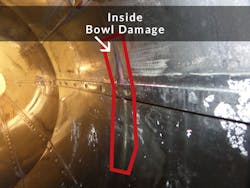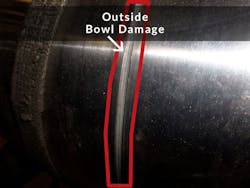How Important is the Bowl Wall Thickness on a Decanter Centrifuge?
Problem
A municipal plant was running a competitor’s centrifuge with extremely high vibrations due to the baffle contacting the bowl. This contact caused a 1.6 mm deep indent on the bowl. The customer was told that the bowl needed to be replaced; repairing it was not an option. Centrisys was contacted for a second opinion.
Evaluation
Our service team was surprised that not only was the bowl distorted, but there was also visible damage on the INSIDE of the bowl. We realized that the bowl wall thickness was only 6 mm. With our 30+ years of centrifuge experience, our opinion is that a decanter centrifuge should have a 16-18mm bowl wall thickness (ours is 18 mm). If the bowl wall was our recommended 16-18mm, this would have been cosmetic damage and the centrifuge could have ran for many more years.
Conclusion
The customer had two options: to replace the centrifuge bowl or replace the entire centrifuge. The customer chose the latter. Smart decision. If the bowl wall thickness was so obviously ignored, what other major problems were around the corner? Keep plant operators safe, don’t ignore quality. CAPEX is yesterday’s news.
Editor's Note: Scranton Gillette Communications and the SGC Water Group are not liable for the accuracy, efficacy and validity of the claims made in this piece. The views expressed in this content do not reflect the position of the editorial teams of Water & Wastes Digest, Water Quality Products and Storm Water Solutions.

